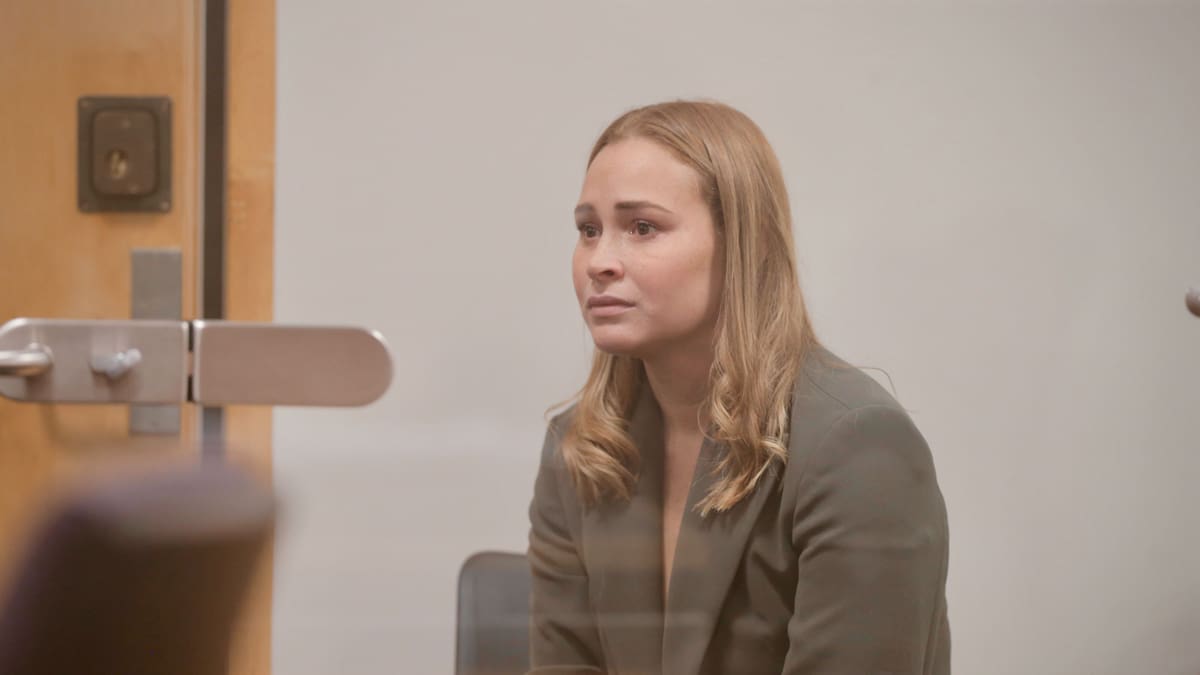“From that point forward, Ms Adams groomed [him],” the agreed summary of facts for the case state. “Ms Adams repeatedly flirted with [the student], commenting on his smile and appearance, buying him vapes and allowing him to use her credit card.”
Myah Adams leaves North Shore District Court in August 2024. Photo / Michael Craig
In September that year, she drove the student to the car park at Parakai Pools, where she performed sex acts on him. She then dropped him off at his home.
“After this incident, Ms Adams asked [the student] to keep the incident ‘on the lowdown’,” court documents state. “She then began sending nude photographs of her body to him on Snapchat.”
The photos were accompanied by sexually explicit messages.
Two and a half weeks after the first incident, the teacher took the student and a friend of his to the movies, giving the victim two cans of alcohol. She behaved inappropriately during the movie, then dropped off the boy’s friend and took the victim again to the Parakai Pools car park, where more sexual acts occurred.
Both the victim and his mother were strongly opposed to Adams receiving permanent name suppression.
“The complainant refers to his emotional and mental health having been severely impacted,” Auckland District Court Judge Brooke Gibson said at her sentencing in May, noting that the victim also reported having lost interest in school since the incidents.
Defence lawyer Emma Priest had pointed out during the sentencing that on the last of the two incidents, the boy was five days short of his 16th birthday.
Defence lawyer Emma Priest. Photo / Supplied
The woman pleaded guilty to a representative charge of sexual conduct with a young person under 16, which is punishable by up to 10 years’ imprisonment. Had the boy been 16, she could not have been charged under that law.
During an appeal hearing earlier this month, Priest tried to persuade Justice van Bohemen that Judge Gibson’s sentence of two years and one month had been manifestly excessive.
Had the sentence been two years or less, the judge could have considered an alternate non-custodial sentence. But he was not willing to do that, he said, because of the deterrence needed for such an abuse of trust by a teacher. He also noted that the Court of Appeal had indicated in previous cases that imprisonment had to be the norm for such offending.
Priest suggested numerous ways in which the court could have allowed a slightly higher discount to allow the sentence to pass the two-year threshold.
But the argument that appeared to most resonate with the High Court justice was that the 5% reduction allowed for the impact imprisonment would have on Adams’ young child was inadequate. She sought a discount of 10 to 15%.
Former teacher Myah Adams appears in Auckland District Court for sentencing in May 2025 after admitting to inappropriate sexual behaviour with a student. Photo / Alex Burton
Crown prosecutor Pearl Philpott acknowledged that Judge Gibson’s end sentence was “stern” but argued it didn’t reach the level of manifestly excessive.
Justice van Bohemen disagreed.
“I consider the starting point adopted by the Judge was too high, although not markedly; the discount for the impact of imprisonment on Ms Adams’ young daughter was too low; and the overall sentence was manifestly excessive,” he wrote.
He allowed a 10% discount for the impact on Adams’ child.
“Although the District Court Judge observed that the Court of Appeal had indicated that imprisonment had to be the norm for this type of offending, that is not an inflexible rule,” he said, allowing the sentence to then be converted to 10 months’ home detention.
He declined Priest’s request for a sentence of community detention, which would have less rigorous restrictions than home detention.
“Such a sentence would not adequately reflect the gravity of Ms Adams’ offending or respond sufficiently to the sentencing purposes of denunciation and deterrence and the need to hold Ms Adams to account,” he wrote.
The High Court justice did, however, allow two conditions of her home detention to be deleted: that she be barred from unsupervised contact with males between the ages of 10 and 16 and have no access to social media.
“Given the particular circumstances in which this offending occurred, Ms Adams’ obvious remorse and the assessment she is of low risk of re-offending, as well as the small community in which she is living, I consider the non-contact condition to be unnecessary and likely to risk further ostracism and may delay Ms Adams’ rehabilitation and reintegration into the community,” he explained.
He also rescinded her sex offender registration.
“I am satisfied Ms Adams does not pose a risk to the victim or other children so does not meet the threshold,” the judge said.
Justice van Bohemen also referred to a report filed prior to Adams’ May sentencing, which opined that incarceration was “unlikely to yield a positive rehabilitative outcome”. She has no prior criminal history and has accepted responsibility, the report noted.
“It also recorded that Ms Adams expressed significant remorse and shame in relation to her offending, demonstrated concern for the victim, and appeared to possess a sound level of insight into her behaviour,” Justice van Bohemen said.
“The assessor’s view was that Ms Adams was likely to respond differently and make more appropriate choices if confronted by a similar situation in the future.”
Craig Kapitan is an Auckland-based journalist covering courts and justice. He joined the Herald in 2021 and has reported on courts since 2002 in three newsrooms in the US and New Zealand.
Sign up to The Daily H, a free newsletter curated by our editors and delivered straight to your inbox every weekday.

